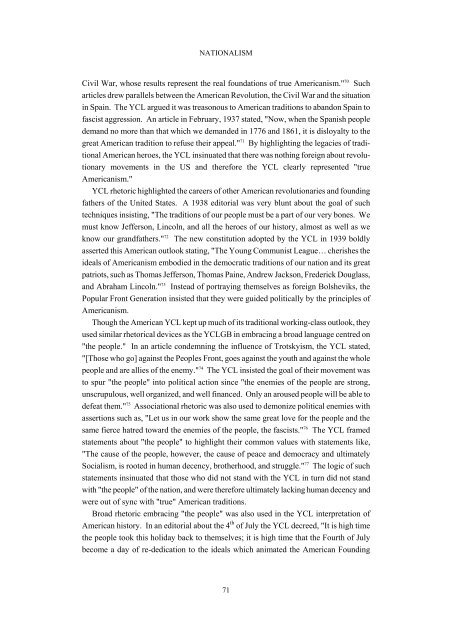Joel A Lewis Youth Against Fascism.pdf
Joel A Lewis Youth Against Fascism.pdf
Joel A Lewis Youth Against Fascism.pdf
You also want an ePaper? Increase the reach of your titles
YUMPU automatically turns print PDFs into web optimized ePapers that Google loves.
NATIONALISM<br />
Civil War, whose results represent the real foundations of true Americanism." 70 Such<br />
articles drew parallels between the American Revolution, the Civil War and the situation<br />
in Spain. The YCL argued it was treasonous to American traditions to abandon Spain to<br />
fascist aggression. An article in February, 1937 stated, "Now, when the Spanish people<br />
demand no more than that which we demanded in 1776 and 1861, it is disloyalty to the<br />
great American tradition to refuse their appeal." 71 By highlighting the legacies of traditional<br />
American heroes, the YCL insinuated that there was nothing foreign about revolutionary<br />
movements in the US and therefore the YCL clearly represented "true<br />
Americanism."<br />
YCL rhetoric highlighted the careers of other American revolutionaries and founding<br />
fathers of the United States. A 1938 editorial was very blunt about the goal of such<br />
techniques insisting, "The traditions of our people must be a part of our very bones. We<br />
must know Jefferson, Lincoln, and all the heroes of our history, almost as well as we<br />
know our grandfathers." 72 The new constitution adopted by the YCL in 1939 boldly<br />
asserted this American outlook stating, "The Young Communist League… cherishes the<br />
ideals of Americanism embodied in the democratic traditions of our nation and its great<br />
patriots, such as Thomas Jefferson, Thomas Paine, Andrew Jackson, Frederick Douglass,<br />
and Abraham Lincoln." 73 Instead of portraying themselves as foreign Bolsheviks, the<br />
Popular Front Generation insisted that they were guided politically by the principles of<br />
Americanism.<br />
Though the American YCL kept up much of its traditional working-class outlook, they<br />
used similar rhetorical devices as the YCLGB in embracing a broad language centred on<br />
"the people." In an article condemning the influence of Trotskyism, the YCL stated,<br />
"[Those who go] against the Peoples Front, goes against the youth and against the whole<br />
people and are allies of the enemy." 74 The YCL insisted the goal of their movement was<br />
to spur "the people" into political action since "the enemies of the people are strong,<br />
unscrupulous, well organized, and well financed. Only an aroused people will be able to<br />
defeat them." 75 Associational rhetoric was also used to demonize political enemies with<br />
assertions such as, "Let us in our work show the same great love for the people and the<br />
same fierce hatred toward the enemies of the people, the fascists." 76 The YCL framed<br />
statements about "the people" to highlight their common values with statements like,<br />
"The cause of the people, however, the cause of peace and democracy and ultimately<br />
Socialism, is rooted in human decency, brotherhood, and struggle." 77 The logic of such<br />
statements insinuated that those who did not stand with the YCL in turn did not stand<br />
with "the people" of the nation, and were therefore ultimately lacking human decency and<br />
were out of sync with "true" American traditions.<br />
Broad rhetoric embracing "the people" was also used in the YCL interpretation of<br />
American history. In an editorial about the 4 th of July the YCL decreed, "It is high time<br />
the people took this holiday back to themselves; it is high time that the Fourth of July<br />
become a day of re-dedication to the ideals which animated the American Founding<br />
71

















